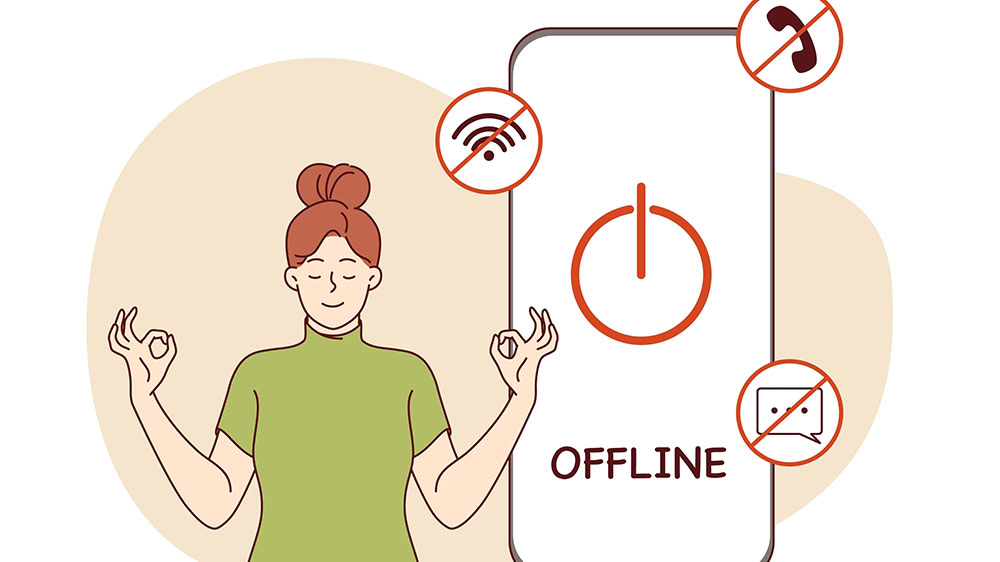Today, digital detox and disconnection is a luxury many no longer dare to afford.
Yet in a world where notifications shout louder than our intuition and remote work blurs the line between personal and professional life, unplugging has become an urgent—and joyfully healing—necessity.
Stepping away (even a little) from our screens isn’t escaping reality—it’s returning to ourselves, to others, and to what truly matters. Still skeptical? Let’s explore.
🔄 1. The Big Blur Between Work and Personal Life
Before smartphones, people left the office at 6 p.m. and that was it.
Now your inbox follows you into bed. Slack messages at 9 p.m.? Normal. Work comments during Sunday dinner? Expected.
This blurred line fuels a fatigue born of never really switching off. And it’s widespread—62% of workers say they struggle to set boundaries between personal and professional life.
The right to disconnect may be law in France, but tech keeps the office in our pockets.
🧠 2. An Overloaded Brain: Warning, Overheating!
Our brains need breaks. It’s during these pauses that creativity sparks, memory consolidates, and great ideas surface.
But constant switching between apps, emails, and chats increases cognitive overload—also known as switch cost—and reduces productivity while increasing stress.
Add in blue light, pinging notifications, and nonstop stimulation… and the result is exhaustion, irritability, and isolation.
Unplugging is a reconnection to your own internal strength.
🎉 3. Digital Detox: A Joyful, Defiant Act
Disconnecting isn’t just healthy—it’s a small revolution.
Not replying to emails at 11 p.m.? That says, my life isn’t just about work.
Putting your phone away at dinner? That says, you matter to me.
Doing nothing for 10 minutes? That says, I value myself.
This isn’t rejecting technology—it’s choosing to use it consciously and intentionally.
🛠️ 4. But How Do You Actually Do It?
Here are some easy-to-adopt digital detox rituals—pick what fits your lifestyle:
- 🌙 Digital curfew: Turn off screens at least 1 hour before bed.
- 🏠 “White zone” at home: No Wi-Fi or phones—a calm space for reading or relaxing.
- 📵 One off-day per week: Try a Sunday without social media—you’ll love the slow pace.
- 👀 The 20/20/20 rule: Every 20 minutes, look 20 feet away for 20 seconds to give your eyes and brain a break.
- 📧 Eco-friendly emailing: No emails after 7 p.m.? Suggest it to your team—it supports mental health and team unity.
🏢 5. Companies That Embrace Disconnection
Some forward-thinking companies are taking action:
- Volkswagen limits emails outside working hours.
- Michelin has a designated “Digital Detox Day.”
- MAIF champions the right to disconnect for its employees.
The message? Disconnection fuels productivity—not the other way around.
It encourages engagement, creativity, and loyalty by proving that employee well-being matters.
🏡 6. And What About Remote Work?
Remote work offers flexibility—but it can also erase boundaries.
When work spills onto the couch, into the kitchen, or under the duvet, burnout isn’t far behind.
Set rituals:
- Defined working hours
- A dedicated workspace
- A symbolic “commute” (e.g., a 10-minute walk at day’s end)
These help simulate the work-life boundary—even from home.
💞 7. Disconnection Is Reconnection to What Matters
Less screen time = more face time.
Fewer emails = more real connection.
Less scrolling = more silence, presence, and peace.
Digital detox isn’t loss—it’s gain:
Of breath.
Of space.
Of depth.
Of life.
Because what we truly seek—meaning, recognition, time well spent—isn’t found in notifications.
It’s found here. Now.
✨ Conclusion: Unplug to Truly Recharge
Digital disconnection isn’t just for monks or tech skeptics.
It’s an essential skill for thriving in a connected world without losing yourself.
By creating screen-free pockets in your day, you allow yourself to think, feel, create, and live fully.
So tonight… what if you left your phone in another room?
You might just sleep better—and dream bigger.
Sources :
- Harvard Business Review – The Case for the Right to Disconnect
- World Economic Forum – Digital Detox: Why We Need It More Than Ever
- American Psychological Association – Technoference: Technology and Its Toll on Relationships
- Nature – Rest and Creativity: The Science Behind Mental Breaks
- The Guardian – Always On: How Constant Connection is Draining Our Brains


